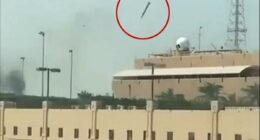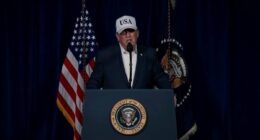Share this @internewscast.com

WASHINGTON – The presence of U.N. peacekeepers in Lebanon has become a point of contention between the United States and its European counterparts, affecting Middle Eastern security concerns and straining relations with key allies like France, Britain, and Italy.
The peacekeeping mission, known as UNIFIL, is under review as its current mandate is set to expire at the end of August, requiring renewal by the U.N. Security Council. Originally established to manage the withdrawal of Israeli forces from southern Lebanon following their 1978 incursion, the mission was expanded after the 2006 conflict between Israel and Hezbollah.
For many years, this international force has been crucial in overseeing the security dynamics in southern Lebanon, including after last year’s conflict between Israel and Hezbollah. However, it has faced criticism from various quarters, including U.S. lawmakers who are now influential in President Donald Trump’s administration.
Appointees in the Trump administration took office with the objective of terminating UNIFIL promptly. They view the operation as ineffective and costly, impeding efforts to curb Hezbollah’s power and returning full security control to the Lebanese Armed Forces, which the Lebanese government claims it is not ready to assume.
Following significant reductions in U.S. contributions to the peacekeeping mission, Secretary of State Marco Rubio approved a strategy last week aimed at phasing out UNIFIL over the next six months, as reported by sources within the Trump administration and congress.
This action is part of the Trump administration’s broader agenda to scale back foreign commitments and expenditures, marked by skepticism towards international alliances and cuts to funding for U.N. initiatives. The division between transatlantic partners is also evident in their diverging approaches to conflicts and issues, including Israel’s war on Hamas in Gaza, the Russia-Ukraine crisis, as well as trade, technology, and freedom of speech.
Europeans push back against a quick end to UN peacekeeping in Lebanon
Israel has for years sought an end to UNIFIL’s mandate, and renewal votes have often come after weeks of political wrangling. Now, the stakes are particularly high after last year’s war and more vigorous opposition in Washington.
European nations, notably France and Italy, have objected to winding down UNIFIL. With the support of Tom Barrack, U.S. ambassador to Turkey and envoy to Lebanon, they successfully lobbied Rubio and others to support a one-year extension of the peacekeeping mandate followed by a time-certain wind-down period of six months, according to the administration officials and congressional aides, who spoke on condition of anonymity to discuss private diplomatic negotiations.
Israel also reluctantly agreed to an extension, they said.
The European argument was that prematurely ending UNIFIL before the Lebanese army is able to fully secure the border area would create a vacuum that Hezbollah could easily exploit.
The French noted that when a U.N. peacekeeping mission in Mali was terminated before government troops were ready to deal with security threats, Islamic extremists moved in.
With the U.S. easing off, the issue ahead of the U.N. vote expected at the end of August now appears to be resistance by France and others to setting a firm deadline for the operation to end after the one-year extension, according to the officials and congressional aides.
French officials did not respond to requests for comment.
The final French draft resolution, obtained by The Associated Press, does not include a date for UNIFIL’s withdrawal, which U.S. officials say is required for their support. Instead, it would extend the peacekeeping mission for one year and indicates the U.N. Security Council’s “intention to work on a withdrawal.”
But even if the mandate is renewed, the peacekeeping mission might be scaled down for financial reasons, with the U.N. system likely facing drastic budget cuts, said a U.N. official, who was not authorized to comment to the media and spoke on condition of anonymity.
One of the U.S. officials said an option being considered was reducing UNIFIL’s numbers while boosting its technological means to monitor the situation on the ground.
The peacekeeping force has faced criticism
There are about 10,000 peacekeepers in southern Lebanon, while the Lebanese army has around 6,000 soldiers, a number that is supposed to increase to 10,000.
Hezbollah supporters in Lebanon have frequently accused the U.N. mission of collusion with Israel and sometimes attacked peacekeepers on patrol. Israel, meanwhile, has accused the peacekeepers of turning a blind eye to Hezbollah’s military activities in southern Lebanon and lobbied for its mandate to end.
Sarit Zehavi, a former Israeli military intelligence analyst and founder of the Israeli think tank Alma Research and Education Center, said UNIFIL has played a “damaging role with regard to the mission of disarming Hezbollah in south Lebanon.”
She pointed to the discovery of Hezbollah tunnels and weapons caches close to UNIFIL facilities during and after last year’s Israel-Hezbollah war, when much of the militant group’s senior leadership was killed and much of its arsenal destroyed. Hezbollah is now under increasing pressure to give up the rest of its weapons.
U.N. spokesman Stephane Dujarric said UNIFIL continues to discover unauthorized weapons, including rocket launchers, mortar rounds and bomb fuses, this week, which it reported to the Lebanese army.
Under the U.S.- and France-brokered ceasefire, Israel and Hezbollah were to withdraw from southern Lebanon, with the Lebanese army taking control in conjunction with UNIFIL. Israel has continued to occupy five strategic points on the Lebanese side and carry out near-daily airstrikes that it says aim to stop Hezbollah from regrouping.
Lebanon supports keeping UN peacekeepers
Lebanese officials have called for UNIFIL to remain, saying the country’s cash-strapped and overstretched army is not yet able to patrol the full area on its own until it.
Retired Lebanese Army Gen. Khalil Helou said that if UNIFIL’s mandate were to abruptly end, soldiers would need to be pulled away from the porous border with Syria, where smuggling is rife, or from other areas inside of Lebanon — “and this could have consequences for the stability” of the country.
UNIFIL “is maybe not fulfilling 100% what the Western powers or Israel desire. But for Lebanon, their presence is important,” he said.
The United Nations also calls the peacekeepers critical to regional stability, Dujarric said.
UNIFIL spokesperson Andrea Tenenti said deciding on the renewal of the mandate is the prerogative of the U.N. Security Council.
“We are here to assist the parties in implementation of the mission’s mandate and we’re waiting for the final decision,” he said.
___
Associated Press writer Edith M. Lederer at the United Nations contributed to this report.
Copyright 2025 The Associated Press. All rights reserved. This material may not be published, broadcast, rewritten or redistributed without permission.










